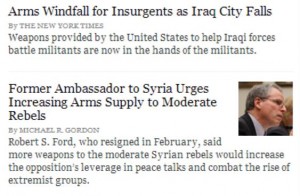Amid Even More Training Failures, US Frames Syrian Effort as Just Starting. Again.
Alert readers here who have kept their scorecards up to date know that the “secret” US effort to train rebels in Syria actually began as early as November of 2012, more than two and a half years ago, even though Obama did his best to obscure that date once it became expedient to nudge the date of entry for the first graduates of that program. The US later decided to go above-board with the training effort for Syria (after spectacular failures of identifying “moderates”), and last fall approved $500 million to a program to train and arm those elusive “moderates” once again. Despite the huge expenditure authorized for the program, it turns out that the US appears to have overlooked a key detail: the “moderate” rebels whom they seek to now fight only ISIS and not Assad simply don’t exist. We can only presume that those who wish to fight Assad are funneled to the covert program, which appears to have been put into place to topple Assad from power.
Robert Burns of AP has a story today describing how the US program has failed to produce the thousands of trainees that were planned:
Fewer than 100 Syrian rebels are currently being trained by the U.S. military to fight the Islamic State group, a tiny total for a sputtering program with a stated goal of producing 5,400 fighters a year.
The training effort is moving so slowly that critics question whether it can produce enough capable fighters quickly enough to make a difference. Military officials said last week that they still hope for 3,000 by year’s end. Privately, they acknowledge the trend is moving in the wrong direction.
/snip/
The main problem thus far has been finding enough Syrian recruits untainted by extremist affiliations or disqualified by physical or other flaws. Of approximately 6,000 volunteers, about 1,500 have passed muster and await movement to training camps in other countries. Citing security concerns, the Pentagon will not say exactly how many are in training. Officials said that as of Friday, the number was under 100 and that none has completed the program.
“We have set the bar very high on vetting,” said Col. Steve Warren, a Pentagon spokesman.
Maj. Gen. Michael Nagata, the Central Command special operations commander who is heading the program, wants volunteers with more than a will to fight.
“We are trying to recruit and identify people who … can be counted on … to fight, to have the right mindset and ideology,” and at the same time be willing to make combating IS their first priority, Defense Secretary Ash Carter told the House Armed Services Committee on June 17.
“It turns out to be very hard to identify people who meet both of those criteria,” Carter said.
Many Syrian rebel volunteers prefer to use their training to fight the government of President Bashar Assad, the original target of their revolution. While IS has been a brutal occupant of much of their country, the rebels see the extremists as fighting a parallel war.
Ah, but fear not, dear US war mongers! Burns reports that when Tammy Duckworth recently asked Joint Chiefs Chair Dempsey if this training effort was worth continuing, he had this ringing endorsement of the the program: “It’s a little too soon to give up on it.”
So, we’ve had the covert training going on for 32 months. We approved $500 million for open training nine months ago, but have under a hundred trainees in the program now, with zero graduates. And yet, if you ask the military, training in Syria is just getting started and it’s too soon to give up on it. Recognizing failure is just not possible in the US military.

